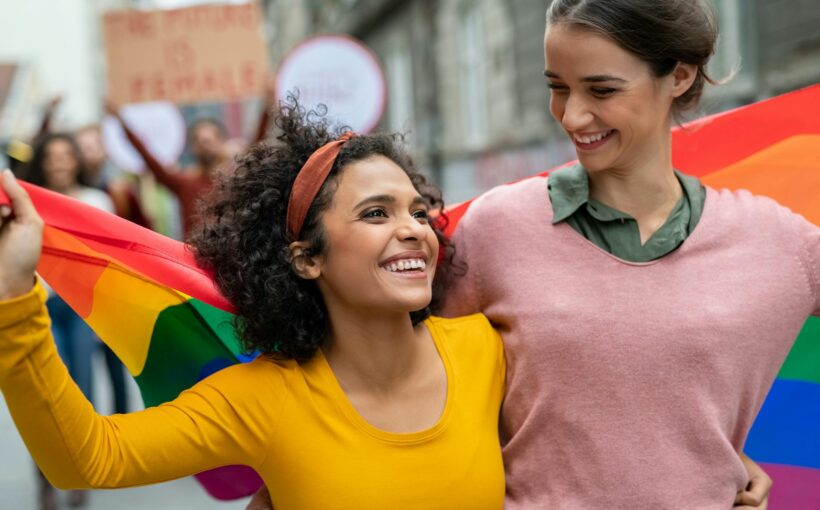
For LGBTQ+ baby boomers, coming out in your 30s was the norm. The average age to come out among Gen Z is in your teens.
Greater social acceptance and more LGBTQ+ representation in culture, such as the Netflix series Heartstopper and Sex Education, are making it easier for young people to be open about their sexuality and identity.
Despite this, some people still don’t come out until their late 20s, 30s or later. If you are in this position, you may feel like you are “behind” younger people who are openly LGBTQ+. But you are not alone. Coming out is a process that unfolds over time, and may take longer for some than for others.

This article is part of Quarter Life, a series about issues affecting those of us in our 20s and 30s. From the challenges of beginning a career and taking care of our mental health, to the excitement of starting a family, adopting a pet or just making friends as an adult. The articles in this series explore the questions and bring answers as we navigate this turbulent period of life.
You may be interested in:
Five important things you should have learned in sex ed – but probably didn’t
Sex Education: a sex therapist’s advice on having a successful long-distance relationship
An LGBTQ+ person first has to recognise and accept their sexual orientation or gender identity, before making decisions about whether, when, and how to tell others. The time it takes to fully understand and accept your sexuality or gender and be ready to disclose it to others can vary considerably.
You may know that you are LGBTQ+ from a young age, or this self-discovery may happen later in life. You may experience fluidity in your sexuality or gender identity, whereby your identity may shift over time.
If you identify as bisexual or non-binary, you may face additional challenges such as feeling misunderstood or pressure to “pick a side”, due to limited social understanding and stereotypes that these identities are “just a phase”.
If you are in your 20s or 30s, you may have received relatively little LGBTQ+ inclusive relationship and sex education (RSE) at school. In the UK, you may have been at school under section 28 which prohibited the “promotion” of homosexuality. The chilling effect of this law persisted even after its repeal in 2003, with many educators cautious about openly discussing LGBTQ+ topics.
Statutory guidance in 2020 made LGBTQ+ inclusive RSE compulsory. But it left room for inconsistency in how it is taught.
Read more: UK’s LGBT teachers still scarred by the legacy of homophobic legislation more than 30 years on
Internalised stigma
If you are from a conservative religious or cultural background, you may be dealing with anti-LGBTQ+ attitudes in your family or community. This can lead to internalised stigma, shame and delayed self-acceptance. Research suggests that people from ethnic minority communities may have culturally specific challenges.
Coming out also isn’t one time event. You might choose different levels of openness depending on the context and may be more out in some spheres of life than others. You might be “out” to friends before telling family. It is also not always a linear process. Some people may “go back into the closet” due to negative reactions, experiences or social stigma.
My research with colleagues at Coventry University into so-called “conversion therapy” found that people who had been subjected to efforts to change their sexuality reported that they were discouraged from telling others they were LGBTQ+. Many also said that it negatively affected their mental health and delayed their self-acceptance.
It can take time to undo years of internalised stigma and shame, so be kind to yourself. Remember that negative thoughts and feelings about being LGBTQ+ are often rooted in messages from your social environment, not a reflection of your intrinsic worth.
Challenges and benefits of coming out later
While societal acceptance has progressed, coming out in your quarter life can present unique challenges. You may fear, for example, that it will impact relationships and friendships that you have established over many years.
If you are with a heterosexual partner in early adulthood, breaking the news to them and any children from the relationship can be particularly challenging.
On the other hand, coming out later may give you the benefit of a more developed understanding of yourself, and greater interpersonal skills gained from more life experience. You may also have more independence from your parents, which can help if they have a negative reaction.

How important is coming out?
Research suggests that living authentically is generally associated with greater psychological wellbeing. But coming out is an individual choice and no one should be pressured to disclose their LGBTQ+ status to others, particularly if it may put your safety at risk. LGBTQ+ people may be at risk of “honour”-based violence or forced marriage in some communities.
Meanwhile, concealing your identity can have complex mental health implications. While it might protect you from discrimination, keeping your authentic self a secret can be a significant source of stress.
If you are newly learning about your sexuality, identifying as LGBTQ+ or thinking about coming out, finding peer support can be helpful. You may want to join an LGBTQ+ group in your community or online, confide in a trusted person or seek support from a professional or an LGBTQ+ charity.
No one can tell you how to identify or whether you should come out, but they may help you to clarify your sense of self, explore the pros and cons of coming out and help you navigate the process.
Remember, your loved ones may experience a range of emotions when you come out to them. Give them time and space to process their own feelings. While their initial reaction might not be what you hope for, it doesn’t define your future relationship. With time to adjust, your relationship may even grow stronger.
Everyone’s journey is unique, and deciding whether and when to come out should be guided by personal comfort and safety. Ultimately, there’s no right time to come out, and it’s never too late to live authentically.
![]()
Adam Jowett's research on so-called conversion therapy was funded by the UK Government Equalities Office. He is Chair of the British Psychological Society's Equality, Diversity and Inclusion Board.



